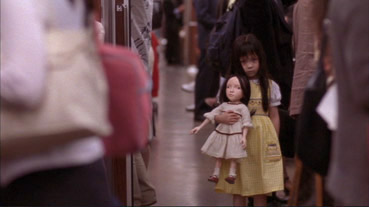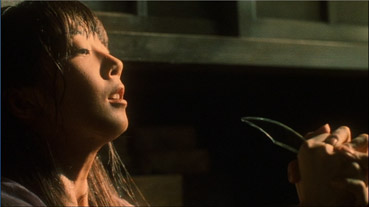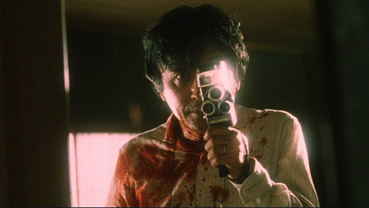|
To
the horror fans out there, see if the following rings any
bells. A
film production company decides to make
a movie recreating the events of a particularly nasty massacre
that took place at an isolated rural hotel a few years earlier,
and the actress who has been cast in a key role begins having visions
of the real murder victims. These intensify when the
director takes his young cast to the hotel where the killings took place – now run down and long-since abandoned – so they can soak up the atmosphere and get a better
feel for their roles. Anyone like to guess what happens
next?
OK,
maybe you haven't come across this exact premise, but I'll
lay money that there were a few nods of recognition at the
above. It is the way of horror movies that people
go willingly to places that the audience knows they should stay
away from, and on the list of Please Don't Go There locations, the site of a series of brutal murders must rank
pretty high. But if you found that familiar,
it doesn't end there. The isolated hotel with a dark history inevitably
recalls The Shining, the ghosts of the
departed have more than a touch of George Romero about them,
and the little girl who appears to the in-film production's leading lady Sugiura can't help but feel like the latest in a series of creepy
children that have populated J-horror films in recent years.

But
in the hands of Ju-On: The Grudge director
Shimizu Takashi, what the film loses in over-familiarity
it quickly claws back in unsettling atmosphere and eerie
imagery. Repeatedly, we get exactly what horror (and particularly
J-horror) film convention leads us to expect, but more often
than not it is given just enough of a twist to still get
the skin crawling. This expected/unexpected style is set
up early in the film, as a night-time lorry driver brakes just too
late to avoid the immobile hotel porter standing strangely
in the middle of the road. When the driver descends from
his cab, there is (inevitably) no-one there, but when he
checks under the lorry the victim is lying on the ground,
staring accusingly at him. Worse still, when he looks up
at the atmospherically wind-swept trees by the roadside,
a series of ghoulish faces are visible floating in the darkness.
Just this one sequence has prompted a wide-eyed reaction
from everyone I've so far shown it to.
A
similar approach is taken to Sugiura's first encounter with
the ghostly young girl, the massacre victim on whom her role in the film is based (the in-film director's decision
to change the age of this character could be read as a comment
on the way filmmakers 'adapt' events and characters to better
target the film's potential demographic, but of course also
allows Shimizu himself to do the very same thing). Her first glimpse
of the girl in a crowded train follows the usual 'see
her, get distracted, turn back and she's gone' formula,
but when she reappears she is no longer further down the carriage,
but right up close and mingling with alighting passengers, then dropping down between the train and the platform and staring up
at Sugiura from the darkness below. A further link with
past genre films is provided by the oversized doll the
girl carries around with her, a typically odd-looking creature
that you just know is going to start moving on its own sooner
or later. When it does, however, the effect is still pleasingly
disturbing, and later, as it marches down a corridor towards
the camera, nightmarishly surreal.

Reincarnation [Rinne] is stalked by déjà-vu
and feels at times as if criteria are being ticked off on
the J-horror checklist. But the film nonetheless pulls off
some very effective frissons of chilling horror, and builds
rather nicely to a climax in which the line between the
normal and paranormal worlds gradually collapses. There
are some superficial similarities to Shimizu's earlier Ju-On:
The Grudge 2, which is also centred around the production
of a horror film at a haunted location, as well as featuring the
sort of child you would not want to encounter late at night,
and a lead actress troubled by the spirits of the dead.
But Reincarnation takes the concept a stage
further through the discovery that the killings were captured on film by the murderer himself. It's a concept that provides a nice parallel at the climax,
as a sequence is watched for real in one location and recreated
for entertainment in another, throwing up some interesting
questions about the whole nature of "it really happened"
horror outings, and the debate over how we view documentary
footage as opposed to that we know to be fiction. Ju-On
2 raises its own questions, of course, and the
earlier film remains the more structurally complex of the
two (and will probably be the more widely seen), but for
my money Reincarnation is, despite its
faults, the scarier and more satisfying work.
It
has to be said that J-horror has often been ill served on
UK DVD, with transfers often falling some considerable
way short of those of American or even European films (Premiere
Asia's upcoming release of Ju-On: The Grudge 2
is another example of this). In this respect, Reincarnation
is a pleasant surprise, a largely decent transfer with noticeably
better contrast, colour and detail than the sub-standard
norm. There is some faint picture noise visible and a slight
flicker to some of the scenes (usually interiors), but this
is never really distracting. This could be the result of
shooting on Hi-Def rather than film – I don't know for sure
that this is the case, but the framing is the high def standard
of 1.78:1 rather than the 1.85:1 of projected film. The picture is,
as you'd expect, enhanced for widescreen TVs.

The
three soundtracks available are the usual Tartan trio of Dolby 2.0
stereo, Dolby 5.1 surround and DTS surround. The mix on
the 5.1 and DTS tracks is very much part of the film's atmosphere,
with the surrounds and LFE bass well used. The wider dynamic range offered by these tracks is also put to good use – the old trick of suddenly amplifying an ordinary sound
to make you jump is effective, though is given an interesting
twist here, with the usual telephone ring replaced by the amblified vibration
buzz of a mobile.
Not
much here. The only one that really counts is the Original
Theatrical Trailer (1:18), the ever-present
Trailer Reel more an add for
other Tartan DVD releases, although this does mean trailers
for Park Chan-wook's Vengeance Trilogy, Three
Extremes, Infection and Premonition.
I
know some have been getting a little weary of J-horror of
late, but done well it still knocks the spots off of anything
escaping from the US at the moment, and for all its borrowings,
Reincarnation is certainly a well executed
(no pun intended) and atmospheric piece that did manage to get under my skin. It's also good to see Shimizu Takashi
in non-Ju-On mode before he completes work
on the Japanese Ju-On: The Grudge 3. Tartan's
DVD is pretty much a film-only affair, but the transfer
is better than expected and the sound really delivers.
The Japanese convention of surname first has been used for all Japanese names in this review.
|